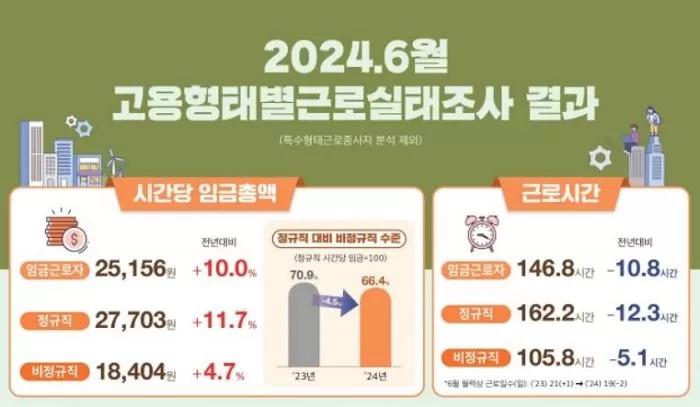"High competition makes it natural to receive more" vs "Does this mean my labor is cheap?"
Young people are expressing mixed reactions regarding the survey results that show the wages of non-regular workers are only 66.4% of those of regular workers.
According to the 'Employment Status Survey by Employment Form as of June 2024' published by the Ministry of Employment and Labor on the 29th, the average hourly wage for all workers as of June last year was 27,703 won for regular workers and 18,404 won for non-regular workers.
The wage gap between regular and non-regular workers has decreased by 4.5 percentage points compared to the previous year’s 70.9%.
As opinions emerge that this gap is unfair, reactions vary between young people who have managed to secure regular jobs despite economic downturns and a tough job market, and those who have unintentionally been pushed into non-regular positions.

Some netizens who argue that the wage gap between regular and non-regular workers is "natural" mainly refer to the differences in effort and resultant outcomes. They expressed sentiments such as, "If the time and effort are different, how can it not be fair?", "I devoted my entire twenties to become a regular employee," and "I can't perform if paid the same as non-regular employees."
On the contrary, some netizens claim that the wage gap between regular and non-regular workers is due to the polarization of the labor market, where even those who do their best can sometimes end up as non-regular workers. They stated, "It is unjust to receive different pay for the same work," "Who can judge the value of labor based on what criteria?" and "It feels like saying my labor is cheap."

Meanwhile, a study on 'Job Gap and Perceptions of the Labor Market' commissioned by the Presidential Committee on National Cohesion on the 20th found that 8 out of 10 workers believe policies are needed to address the gap between large companies with regular employees and small businesses with non-regular employees.
Additionally, American political philosopher Michael Sandel, a professor at Harvard University, noted in his book 'The Tyranny of Merit' that "My efforts belong to me, but such efforts can also be made by losers," arguing that "meritocracy does not heal inequalities; it merely justifies them."
However, thoughts among young people, including those just starting their careers, who are feeling the tightening job market and the imbalanced labor market, are diverse.
Kim Jae-hoon, the Director of Labor Market Research at the Ministry of Employment and Labor, explained the survey results by stating, "The majority of regular jobs are salary-based or annual salary-based, and as working days decreased, the average hourly wage increased more. The low wage growth rate of non-regular workers due to an increase in part-time workers also impacted this."

Image source: Reference images for understanding the article / gettyimagesbank, photo = Ministry of Employment and Labor


